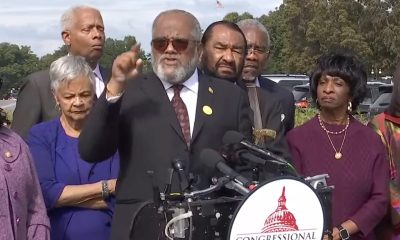City Government
Oakland City Council Campaigns Ready to Go Live
Ending months of rumors about possible contenders, the Oakland City Clerk this week published the list of candidates who have filed to run in November for positions on the Oakland City Council.
Five City Council seats will be on the ballot: councilmember-at-large, District 1, District 3, District 5 and District 7.
Incumbent Councilmember-at-Large Rebecca Kaplan will face four opponents, the most contenders of any of the city races.
Kaplan has served on the council since 2008. She previously served as an elected director on the AC Transit Board and worked as a housing rights attorney in Oakland.
Kaplan recently has been in the public spotlight for championing measures for renters’ protection and a civilian police commission, which will both be on the ballot in November.
One of Kaplan’s opponents is Peggy Moore – until this month the senior special adviser to Libby Schaaf – who is politically well connected.
Moore, who resigned from her position in the Mayor’s Office on Aug. 12, was campaign manager for Mayor Schaaf, has served as Hillary Clinton’s California primary campaign director and previously ran for District 2 representative on the City Council.
Also running against Kaplan are Matt Hummel, businessman, attorney Bruce Quan and tax specialist Nancy Sidebotham.
Hummel is chair of the city’s Cannabis Regulatory Commission and attended Holy Names University.
Quan, a retired law professor, says he sees himself as a problem solver dedicated to efficiency and cutting waste.
East Oakland resident Sidebotham has previously run for City Council half a dozen times. She has lived in Oakland for more than 50 years and served on the Community Policing Advisory Board, Neighborhood Watch and Shop Oakland boards.
District 1 incumbent Dan Kalb will face Kevin Corbett.
Kalb has worked as a policy analyst, environmental, public interest and social justice advocate, policy director and community service volunteer. He has a B.A. degree in Conservation of Natural Resources from UC Berkeley and a master’s degree in Public Administration from the University of San Francisco.
Corbett, an Oakland native, is a probate attorney, businessperson and community volunteer. He is a former member of the city’s Community & Economic Development Advisory Committee.
City Council President Lynette Gibson McElhaney, who represents District 3, will face Oakland native and community activist Noni Session.
McElhaney is executive director of Neighborhood Housing Services of the East Bay and studied political science at UC Berkeley.
Session is a Ph.D. candidate in cultural anthropology at Cornell University. She grew up in West Oakland and attended McClymonds High School.
District 5 representative Noel Gallo is running against Viola Gonzales, who previously served on the Oakland Board of Education as an appointee of then-Mayor Jerry Brown.
Gallo grew up in the Fruitvale District of Oakland and is a former school board member. He has been outspokenly in support of holding police accountable to the community and renters’ protections. He organizes and participates in weekly anti-blight trash cleanups in his district.
Gonzales was until June 30 the chief executive officer of Anew America, which helps immigrants and refugees start small and micro-business. According to Gonzales’ website, she is supported by Mayor Schaaf, former Councilmember Ignacio de la Fuente and former Mayor Elihu Harris.
Longtime District 7 Councilmember Larry Reid will be in a race against two opponents: Nehanda Imana, a community activist and leader in Communities for a Better Environment (CBE); and Marcie Hodge, previously a member of the Peralta Community College District Board.
Reid, now in his fifth term, was elected by the council this year to serve as vice mayor. He has successfully worked to bring retail development centers, market rate housing projects and premier auto dealership developments to his district.
Hodge ran against Desley Brooks for City Council in 2006 and also ran for mayor in 2010. According to media reports at the time, she had the backing of Senator Don Perata and Councilmember de la Fuente.
Imana works as an environmental activist. In addition to serving as an East Oakland community organizer, she is an adjunct teacher for African American and Environmental Studies at Merritt College. She created the first Environmental Racism/Justice course at the Peralta Community College District.
Activism
Oakland Post: Week of December 31, 2025 – January 6, 2026
The printed Weekly Edition of the Oakland Post: Week of – December 31, 2025 – January 6, 2026

To enlarge your view of this issue, use the slider, magnifying glass icon or full page icon in the lower right corner of the browser window.
Activism
Oakland Post: Week of December 24 – 30, 2025
The printed Weekly Edition of the Oakland Post: Week of – December 24 – 30, 2025

To enlarge your view of this issue, use the slider, magnifying glass icon or full page icon in the lower right corner of the browser window.
Alameda County
Oakland Council Expands Citywide Security Cameras Despite Major Opposition
In a 7-1 vote in favor of the contract, with only District 3 Councilmember Carroll Fife voting no, the Council agreed to maintain its existing network of 291 cameras and add 40 new “pan-tilt-zoom cameras.”

By Post Staff
The Oakland City Council this week approved a $2.25 million contract with Flock Safety for a mass surveillance network of hundreds of security cameras to track vehicles in the city.
In a 7-1 vote in favor of the contract, with only District 3 Councilmember Carroll Fife voting no, the Council agreed to maintain its existing network of 291 cameras and add 40 new “pan-tilt-zoom cameras.”
In recent weeks hundreds of local residents have spoken against the camera system, raising concerns that data will be shared with immigration authorities and other federal agencies at a time when mass surveillance is growing across the country with little regard for individual rights.
The Flock network, supported by the Oakland Police Department, has the backing of residents and councilmembers who see it as an important tool to protect public safety.
“This system makes the Department more efficient as it allows for information related to disruptive/violent criminal activities to be captured … and allows for precise and focused enforcement,” OPD wrote in its proposal to City Council.
According to OPD, police made 232 arrests using data from Flock cameras between July 2024 and November of this year.
Based on the data, police say they recovered 68 guns, and utilizing the countywide system, they have found 1,100 stolen vehicles.
However, Flock’s cameras cast a wide net. The company’s cameras in Oakland last month captured license plate numbers and other information from about 1.4 million vehicles.
Speaking at Tuesday’s Council meeting, Fife was critical of her colleagues for signing a contract with a company that has been in the national spotlight for sharing data with federal agencies.
Flock’s cameras – which are automated license plate readers – have been used in tracking people who have had abortions, monitoring protesters, and aiding in deportation roundups.
“I don’t know how we get up and have several press conferences talking about how we are supportive of a sanctuary city status but then use a vendor that has been shown to have a direct relationship with (the U.S.) Border Control,” she said. “It doesn’t make sense to me.”
Several councilmembers who voted in favor of the contract said they supported the deal as long as some safeguards were written into the Council’s resolution.
“We’re not aiming for perfection,” said District 1 Councilmember Zac Unger. “This is not Orwellian facial recognition technology — that’s prohibited in Oakland. The road forward here is to add as many amendments as we can.”
Amendments passed by the Council prohibit OPD from sharing camera data with any other agencies for the purpose of “criminalizing reproductive or gender affirming healthcare” or for federal immigration enforcement. California state law also prohibits the sharing of license plate reader data with the federal government, and because Oakland’s sanctuary city status, OPD is not allowed to cooperate with immigration authorities.
A former member of Oakland’s Privacy Advisory Commission has sued OPD, alleging that it has violated its own rules around data sharing.
So far, OPD has shared Flock data with 50 other law enforcement agencies.
-

 Activism4 weeks ago
Activism4 weeks agoDesmond Gumbs — Visionary Founder, Mentor, and Builder of Opportunity
-

 Activism4 weeks ago
Activism4 weeks agoFamilies Across the U.S. Are Facing an ‘Affordability Crisis,’ Says United Way Bay Area
-

 Alameda County4 weeks ago
Alameda County4 weeks agoOakland Council Expands Citywide Security Cameras Despite Major Opposition
-

 Alameda County4 weeks ago
Alameda County4 weeks agoBling It On: Holiday Lights Brighten Dark Nights All Around the Bay
-

 Activism4 weeks ago
Activism4 weeks agoBlack Arts Movement Business District Named New Cultural District in California
-

 Activism4 weeks ago
Activism4 weeks agoLu Lu’s House is Not Just Toying Around with the Community
-

 Activism4 weeks ago
Activism4 weeks agoOakland Post: Week of December 17 – 23, 2025
-

 Black History3 weeks ago
Black History3 weeks agoAlfred Cralle: Inventor of the Ice Cream Scoop



















































